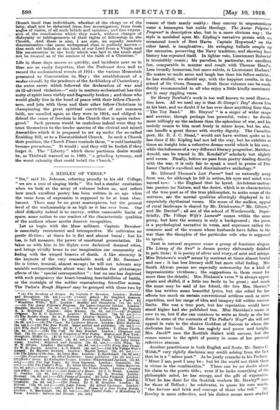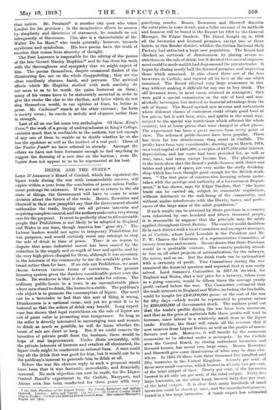A MEDLEY OF VERSE.*
" Bre," said Dr. Johnson, referring proudly to his old College, " we are a nest of singing birds" We feel a similar exultation when we look at the array of volumes before us, and reflect how much excellent poetry has been written in an age when the verse form of expression is supposed to be at least obso- lescent. There may be no great masterpieces, but the general level of the workmanship is as high as it has ever been. Our chief difficulty indeed is to convey, within reasonable limits of space, some notion to our readers of the characteristic qualities of the authors whose merits deserve recognition.
Let us begin with the Muse militant. Captain Bewahms is essentially reminiscent and introspective. He cultivates no poetic diction ; at times he is flat and almost banal ; but he has, in full measure, the power of emotional presentation. He takes us with him in his flights over darkened doomed cities, and brings vividly home to our imagination our ocurununity of feeling with the winged bearers of death. A like sincerity is the keynote of the very remarkable work of Mr. Bassoon., He is bitter, ironical, almost savage; he will not tolerate any amiable sentimentalities about war; he loathes the picturesque effects of the " special correspondent " : but no one has depicted with such poignancy the heart-breaking inevitabilities of battle, or the nostalgia of the soldier remembering friendlier scenes. The Padre's Rough 'apnea' may be grouped with these two by • (1) The Bombing of BMOCS. By Captain P. Bewsher. London : Hodder and Stoughton. [6s. net.]—(2) Counter Attack. By Siegfried Bassoon. London : Heinemann. [Is. ed. net..]—(8) Rough Rhyme of a Padre. By " Woodbine Willie," M.O. London: Hodder and Stoughton. [la, ad. net.] —(4) The Anzac Pilgrim' Progress. By Lance-Corporal Cotter. London: Slurp kle; Marshall. I Se. 6d. set.]— (5) The Secret of the Ships. By Captain B. A. Hopwood. London: John Murray. [Ss. Bd. net,]—(5) Frightful Orhysnes. By E. C. Roberts. London: E. Macdonald. [2a ed. net.]--- (7)2'An Bomber Gipsy. By A. P. Herbert. London : Methuen. [8e.Gd.net.]— —BD Si. George's Day. By Henry Newbolt. London: John Murray, [ECG& net.]—(0) The Cause. By Laurence Blnyon. London : Eildn Mathews. 116a. net.i.---(10) The New World. Same author and publisher. pa set.]— (l1) Why Don't They Cheer I By H. J. C. Stead. London : T. Bieber Unveil:. (9a. Gd. net.)---(12) The Call. By Clay Kendall. London : Chapman and Hall. [2e. 6d. not.]—(IS) d Treasury of War Poetry, Boston and New York : Houghton, MIMI. Co. 9115 net.]—(14) Last Poems. By Edward Thomas. 1..mn : Selwyn and Blount. 14'. ed. net.]—(16) Tides. By John Drink- water. London: Sidgwick and Jackson. [2s. Gd. net.]—(10) Whin, By W. W. Gibson. London Macmillan. [Is. Gd. net.]—(17) Forty Peso Poems. By W. H. Davies. London A. C. Filleld. [4s. net.]—(113) The Pillage Wife's Lemont. By Maurice Hewlett. London: Martin Seeker. [Ss. Bd. net.]— (19) The Litany o f the Sun. By Irene Hay. London : E. Maodonald (28. 8d, net.] —(2O) Provocations. By Sibyl Bristowe. Some publisher. [ Se. ad. net.)— (21)Herb o' Grace. By Katharine Tynan. London: Sidgwick and Jackson. (83.6d. net.] (22) The Sod Pears. By Dora Sigerson. London : Constable, [Gs. net.] (2S) The Pedlar's Way. By Alicia Sheridan. London: Elkin Mathews. I le. M. not.]—(24) More Songs of Amu,. By Violet Jacob, London Country Life Office. [Gs. Bd. net.]—(26) Songs of a Miner. By .1. C. Welsh, London: II. Jenkins. [Zs. dd. net City Songs. By R. Rowley. Dublin: Marmsel. [4s. ed. net.]—(271 Peons of London. By John Prealand. London : Macmillan. [4s. Bd. not.] 28) Morley. By Walter De La Mare. London: Constable. [Be. ed. net.] 29) Poems. By G. M. Hopkins. London : H. Me 6d. nei..1—(30) Later Pin.. By Alfred Cochrane Landon: Lanerates. [Gs. not.).—(31) King's Verse : Pawns of a New Poetry Society. London : E. Macdonald. [Ss., ed. net.]—(12) Twice Pats: a Miscellany of Ease. London: Selwyn and Blount, 11s. net.] reason of their manly reality : they convey in =pretentious verge a homespun but noble theology. The Anzac Pilgrim' Progress', is descriptive also, but in s more obvious way ; the style is modelled upon Mr. Kipling's narrative poems with an occasional touch of Bret Harts. Captain Hopwood,' on the other hand, is imaginative ; his swinging ballads couple up the centuries, preserving the Navy tradition, and showing how history has repeated itself. In lighter vein, Lieutenant Roberts' is irresistibly comic ; his parodies, in particular, are excellent fun, comparable in manner and result with Thomas Hood's. Less broadly humorous, but more subtle, is Lieutenant Herbert, He makes us smile more and laugh lees than his fellow-satirist ; he has studied, we should say, with the happiest results, in the school of Sir Owen Seaman. Both these volumes can be confi- dently recommended to all who enjoy a little kindly merriment set in easy rippling verse.
Sir Henry Newbolt's work is too well known to need illustra- tion here. All we need Bay is that St. George's Day' shows him at his best, and we doubt if he has ever done anything finer than "The Toy Band." Mr. Binyon' " is a singer of wider range and sweeter, though perhaps less powerful, voice ; he dwells more willingly on the sadness than the splendour of war, and his melody comes to him most freely in minor keys, but he, also, can handle a great theme with worthy dignity. The Canadian poet, Mr. R. J. C. Stead," would not have written quite as he has done if Mr. Kipling had not led the way, but he exhibits at times an insight into a reflective dream-world which is his own ; while the influence of a very different literary progenitor, Matthew Arnold, can be traced in Mr. Kendall's" scholarly but slightly arid verses. Finally, before we pass from poetry dealing directly with the war, it is only fair to speak a word in praise of Pro- fessor Clarke's excellent and discriminative anthology.° Mr. Edward Thomas's Last Poems" lead us naturally away from war, for although he fell in action, his eyes and mind were turned tow: 's the England that he loved. An intense motion- less passion for Nature, and the desire, which is as characteristic of the true poet as of the true philosopher, to make acme of the universe, are the mental qualities alluringly displayed in his exquisitely rhythmical verses. His sense of the-mellow, appeal of rural landscape is shared by Mr. Drinkwater," Mr. Gibson," and Mr. Davies', ; all are of the school of Wordsworth. Super- ficially, The Village Wife's Lament" comes within the same group, but here the scenery is only a background ; the poem is a psychological narrative in verse, and expresses rather the common soul of the women whose husbands have fallen in the war than the thoughts of the particular wife who is supposed to speak.
Next in natural sequence come a group of feminine singers. The Litany of the Sun" is dream poetry elaborately finished in pale tints; it is poetry of silver and ivory, of mist and mirage. Miss Bristowe's works seems by contrast at times almost brutal and raw ; it has less literary skill but more vital feeling. Her South African poems are especially noteworthy for a kind of impressionistic vividness ; the suggestions in them count for more than the details.; Mrs. Hinkson's verse s is always appro- priate and skilful, if a little too facile to be great ; and much the same may be said of her friend, the late Mrs. Shorter.° She has written some beautiful lyrics, but she relied for her effects too much en certain conventional artifices such as mere repetition, and her range of ides and imagery fell within narrow limits. She was a true poet; but her reputation would have stood higher had she published lees. Miss Sheridan's name is new to us, but if she can continue to write as finely as she has done in some of the contents of The Pedlar's Ways she will not appeal in vain to the elusive Goddess of Success to whom she dedicates her book. She has melody and power and insight Mrs. Jacob'* uses the Scottish dialect with success, but she comes nearer to the spirit of poetry in some of her personal reflective stanzas.
Another practitioner in both English and Scots, Mr. James C. Welsh," very rightly disclaims any credit arising from the fact that he is a " miner poet." As he justly remarks in his Preface: " Miner I am, poet I may be ; but let the world not think there is virtue in the combination." There can be no doubt about his claim to the poetic title ; even if he lacks something of the philosophic mind, he has energy, and the gift of expression. What he has done for the Scottish workers Mr. Rowley" does for those of Belfast ; he celebrates, to quote his own words, "the fervour and faith and courage of those who toil." Mr. Rowley is more reflective, and his dialect seems more studied
than native. Mr. Preslandn is another city poet who takes Loudon for his province ; in the imaginative effects he seoures by-simplicity and directness of statement, he reminds us not infrequently of Stevenson. This also is a characteristic of Mr. Walter De La Mare," who tends generally, however, towards mysticism and symbolism. His love poems have the truth of emotion that comes from sincerity of thought.
The Poet Laureate is responsible for the editing of the poems of the late Gerard Manley Hopkins," and he has done his work with the thoroughness and sympathy that we might expect of him. The poems themselves, despite occasional flashes of the illuminating fire, are on the whole disappointing ; they are too often needlessly obscure, harsh, and perverse. The metrical effects which Mr. Hopkins studied with such assiduity do not seem to us to be worth the pains bestowed on them ; many of his verses have to be elaborately accented in order to give the reader the due to the rhythm, and lyrics which do not sing themselves would, in our opinion at leant, be better in prose. Mr. Cochrane" stands at the other extreme ; his forte is society verse ; he excels in melody and elegance rather than in strength.
Last of all on our list come two anthologies. Of these, King's Verse," the work of a group of undergraduates at King's College, contains much that is creditable to the authors, but not enough of any one of them to enable us to decide whether he or she has the opulence as well as the instinct of a real poet. Three of the Twelve Poets" we have referred to already. Amongst the others we have not been fortunate enough to find anything to suggest the dawning of a new star on the horizon ; even Mr. Squire does not appear to us to be represented at his best.







































 Previous page
Previous page